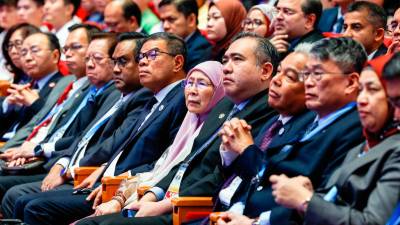PETALING JAYA: Prime Minister Datuk Seri Anwar Ibrahim has urged Asia to take a more assertive and constructive role in shaping the global economy, warning that the international order is facing deep uncertainty and fragmentation.
Delivering a public lecture at Tianjin University in China yesterday, Anwar said the world stands at a critical juncture where long-standing trade rules and institutions are under strain.
He described the current climate as one of “unsettling dislocation”, marked by arbitrary export controls, unchecked subsidies and a retreat from integration and open markets.
“We are at a moment when the world economy feels unsettled. Trade rules that once promised predictability are now capriciously altered or ignored. Where integration was once assumed, fragmentation is now the prevailing mood.”
Anwar said the current upheaval represents the fourth major economic shift since the mid-20th century, following Bretton Woods in 1944, the dollar’s decoupling from gold in 1971 and the liberalisation of capital markets with the rise of the G7.
He said the new reorder is taking shape now with rising trade barriers, the weaponisation of commerce and growing scepticism towards multilateral institutions.
“Each of these reorderings was scripted far from our shores. Asia was present but it was not the author. Today, we have the responsibility to ensure that the next chapter is written with Asian ink as well.”
He warned that this latest wave of fragmentation carries real costs, particularly for emerging economies.
Citing International Monetary Fund data, he said severe trade and technological decoupling could cost some countries up to 12% of GDP, leading to lost livelihoods, delayed medical supplies and diminished opportunities.
“For decades, openness allowed emerging economies to leap forward, converge toward higher incomes and lift millions out of poverty. If capital and technology begin to flow only within gated blocs, the ladder of opportunity may be kicked away just as others are beginning to climb.”
While recognising frustrations with globalisation, he cautioned against isolationism or exclusive economic blocs.
He proposed a model of “sovereign interdependence” instead, protecting national autonomy while embracing openness.
“This is the art of standing tall without standing apart. It is the conviction that nations can remain fully themselves, sovereign in choice, in voice and in destiny, while still being open to the flows of trade, investment, talent and technology on which prosperity depends.”
He also urged fresh thinking on interdependence in both political and economic theory.
He added that the world now requires an evolved framework, where connectivity enhances rather than undermines sovereignty.
“Interdependence should not make nations fearful that their autonomy will be diluted. It should give them confidence that, by being connected, their resilience is multiplied.”
With Asia home to the majority of the world’s youth, and driving global technological and economic growth, Anwar said the region must stop being a passive recipient of policies and instead become an active participant.
“Asia is the engine of global growth. We are not merely the objects of other people’s strategies. We are the authors of our own destiny.”
Anwar also underscored China’s role as a civilisational power, saying its choices would be pivotal in shaping regional openness and stability.
He said Malaysia would continue to champion an open, inclusive and fair global economic order, showing that nations could be sovereign without being suspicious and open without being naive.
